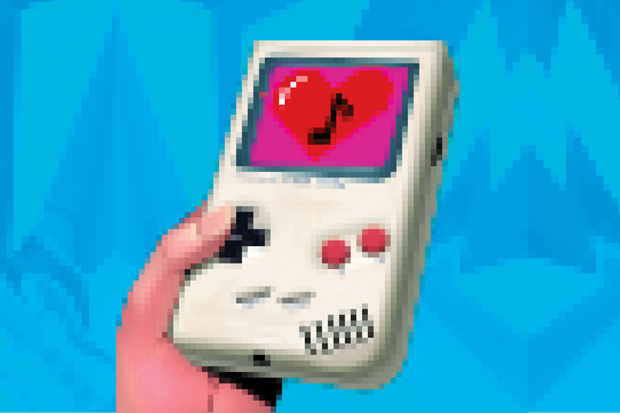Crossing Over
The idea for the Rockage festival first came to Eric Fanali three years ago. He grew up on games, both at home and in South Bay arcades like Aladdin’s Castle and Galactica 2, and has worked in video-game PR for the last 12 years.
So he was instantly hooked when he heard Nintendo cover bands like Sacramento’s the Advantage and Arizona’s Minibosses back in 2004. As a longtime promoter of underground shows locally, he saw Rockage as the perfect way to bring together music and gaming.
“Those are my two loves,” he says. “They can collide on the dance floor.”
He also wanted to have a lineup of bands that cut across genres. “It’s important to have rock music and chip music. I think those cultures are similar. We really just want everyone to rock together,” he says.
For a long time, he thought he’d never really get Rockage off the ground. But then the popularity of the chip music scene grew, and last summer California Extreme let him bring in some bands to their event for the first time, giving him a better sense of how Rockage could work. He attended the most recent MAGFest (Music and Gaming Festival) in Maryland, which drew 6,000 gamers to exactly the type of event he wanted to produce.
“They’ve really got it down,” he says.
In the end, he talked to more than 50 venues in the South Bay, searching for the right place, before he made a deal with the San Jose Women’s Club. Still, he had no idea what he was in for.
“I’ve done bigger shows, like Death Cab for Cutie,” he says. “But this has been the most work.”
For Tucker, Rockage is like a dream come true.
“It truly embodies what I had hoped to do. I didn’t want to just put on concerts, I wanted to do exactly what he’s doing—have games, have that culture there, rock music and chip music, this shared experience,” he says. “He’s nailed it.”
Tucker is also psyched to see Bay Area chip acts like the Glowing Stars and A. Rival get the spotlight at
the festival.
“There are some phenomenal artists in the area who are finally getting some notoriety, and it’s exciting for me to be a part of that,” he says.
Part of the reason for that is mainstream artists like Ke$ha, whose “Tik Tok” was hugely influenced by chiptune.
Matthew Payne of Glowing Stars remembers that the sound of chiptune was once often dismissed as “Mario at a rave.” But his band employs live instruments along with the video-game elements—Lizzie Cuevas handles guitar and lead vocals, while he drums and provides some vocals in addition to programming. Though they’ve only been performing as Glowing Stars for about a year, the two were previously in a punk band together, and had long talked about doing an 8-bit-type project.
“She sent me some songs she was working on, and I just picked up a Game Boy and started programming, and it all came together,” says Payne, who’ll be performing at Rockage not just as part of the band but also solo (he describes his solo music as a combination of doom metal and folk music, with chip elements).
When they first started, Payne made an effort to show their audiences that he was actually using the Game Boy as an instrument. At their first show, Cuevas jokingly referred to the Game Boy as “the third member of the band,” but that’s actually a pretty good way to describe how many chiptune acts incorporate the video game equipment they use onstage and in the studio.
“Usually, it’s just trying to get the point across that this game console is making the music live,” says Payne.
There’s even been a backlash among some chip artists against being linked too closely to game nostalgia.
“In New York, they’ve been doing it longer, and there’s really been an effort to move away from being categorized as Ôvideo game music,'” says Tucker. “Because people who aren’t familiar with what’s going on, sometimes they don’t even know that you’re playing something. They think you’re just turning on a video game system and pressing start.”
Tucker foresees a lot of growth—and maybe growing pains—in the genre.
“I think like anything there will always be the purists, and we need those guys to keep us in check. For a while in the beginning, I kind of ascribed to that—if it’s not pure chip, it’s garbage—but over time, I’ve realized that’s a little limiting. I think what you’ll see if a lot more of these hybrid kind of acts, where it’s an element of the music, but it’s not necessarily the dominant thing. You’re already seeing that in pop music and hip-hop and club music.”
For him, though, and for many of those who will be at Rockage this weekend, it’ll always go back to the greatness of the original games, and their music.
“The truly amazing thing about some of these epic staples—Mario Brothers, Legend of Zelda, etc.—those things are more prevalent in my mind than any pop music from the era, and they’ll always be with me,” he says.
“These little loops and these little bars these guys were able to squeeze out of these machines. When I go back and listen to that stuff, I’m constantly awe-struck at how genius some of those compositions are. They’re so catchy, and so epic, and they make you feel in ways that most music doesn’t.”
.San Jose Rockage Festival Brings Old-School Gaming and Chip Music to Silicon Valley




